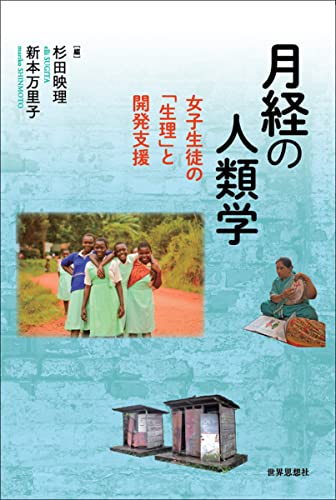5 0 0 0 OA 子連れフィールドワーク
- 著者
- 杉田 映理
- 出版者
- 日本文化人類学会
- 雑誌
- 日本文化人類学会研究大会発表要旨集 日本文化人類学会第50回研究大会 (ISSN:21897964)
- 巻号頁・発行日
- pp.A03, 2016 (Released:2016-04-22)
報告者は、博士課程の学生かつ未婚であった時にウガンダの農村部において1年強の長期フィールドワークをおこなった。そして14年ほどの時を経て、今度は子ども2人を連れて家族とともに同じ農村において住み込みの調査を実施した。本発表では、子連れでフィールドワークを行ったときの調査地での自分の立ち位置が14年前とどう変化したのか、またそれがなぜなのか、さらにフィールドで得られるデータに変化はあったのかを考察したい。
- 著者
- 杉田 映理
- 出版者
- 日本文化人類学会
- 雑誌
- 日本文化人類学会研究大会発表要旨集 The 56th Annual Meeting of the Japanese Society of Cultural Anthropology 日本文化人類学会第56回研究大会 (ISSN:21897964)
- 巻号頁・発行日
- pp.A11, 2022 (Released:2022-09-13)
本報告では、コロナ禍の経済的影響として「生理の貧困」が2021年になって社会的に注目されたことをきっかけに、日本でも広がり始めた生理用品無償配布について考察する。現在、生理用品無償配布は、経済的困窮者の支援だけを目的とした施策となっているが、これまでの海外の動向および本研究におけるトイレ内無償提供の有効性の検証を通じて、生理用品無償配布の目的を問い直したい。
2 0 0 0 OA 月経衛生対処 (MHM) の開発支援および研究の動向
- 著者
- 杉田 映理
- 出版者
- 国際開発学会
- 雑誌
- 国際開発研究 (ISSN:13423045)
- 巻号頁・発行日
- vol.28, no.2, pp.1-17, 2019-11-30 (Released:2020-01-17)
- 参考文献数
- 65
Menstruation, which at first seem to be a private matter of girls and women, has become a part of the global agenda in international development. The issue even has a label “menstrual hygiene management (MHM)” and is involving various stakeholders. The objective of this special issue is to capture the development of MHM assistance, and illustrate the local realities from four different areas based on fieldwork. The cases focus on schools and adolescent school girls in Cambodia, Papua New Guinea, Indonesia, and Nicaragua. Japanese anthropologists, who have worked in each respective country for decades as researchers, and some as practitioners as well, are reporting each case within its local context. By comparing the four cases, it reveals how different (yet in some aspects how similar) the situations are and how important it is to understand each local context when a global recipe is applied to an area.In this first paper here below, I will focus on outlining the recent development of MHM in the international society. After clarifying the multiple aspects of menstruation, I will explain the common definition of MHM used in international development and how MHM is considered significant to achieve various goals of the Sustainable Development Goals (SDGs), namely Goals 3, 4, 5, 6, 8 and 12. Representative interventions that have been conducted are introduced to show the four categories of assistance. After a quick review of the research on menstruation and MHM, I will come back to the four case studies of this special issue to explain the position of these studies within the wider research framework.
1 0 0 0 月経の人類学 : 女子生徒の「生理」と開発支援
- 著者
- 杉田映理 新本万里子編
- 出版者
- 世界思想社
- 巻号頁・発行日
- 2022
1 0 0 0 月経衛生対処 (MHM) の開発支援および研究の動向
- 著者
- 杉田 映理
- 出版者
- 国際開発学会
- 雑誌
- 国際開発研究 (ISSN:13423045)
- 巻号頁・発行日
- vol.28, no.2, pp.1-17, 2019
<p>Menstruation, which at first seem to be a private matter of girls and women, has become a part of the global agenda in international development. The issue even has a label "menstrual hygiene management (MHM)" and is involving various stakeholders. The objective of this special issue is to capture the development of MHM assistance, and illustrate the local realities from four different areas based on fieldwork. The cases focus on schools and adolescent school girls in Cambodia, Papua New Guinea, Indonesia, and Nicaragua. Japanese anthropologists, who have worked in each respective country for decades as researchers, and some as practitioners as well, are reporting each case within its local context. By comparing the four cases, it reveals how different (yet in some aspects how similar) the situations are and how important it is to understand each local context when a global recipe is applied to an area.</p><p>In this first paper here below, I will focus on outlining the recent development of MHM in the international society. After clarifying the multiple aspects of menstruation, I will explain the common definition of MHM used in international development and how MHM is considered significant to achieve various goals of the Sustainable Development Goals (SDGs), namely Goals 3, 4, 5, 6, 8 and 12. Representative interventions that have been conducted are introduced to show the four categories of assistance. After a quick review of the research on menstruation and MHM, I will come back to the four case studies of this special issue to explain the position of these studies within the wider research framework.</p>
- 著者
- 杉田 映理
- 出版者
- 東洋大学大学院
- 雑誌
- 東洋大学大学院紀要 = Bulletin of the Graduate School, Toyo University (ISSN:02890445)
- 巻号頁・発行日
- vol.53, pp.1-16, 2016
